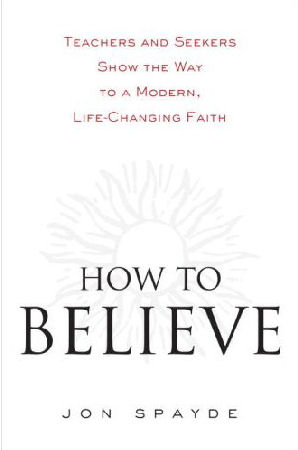
|
Posted March 14, 2008
Book: How to Believe Author: Jon Spayde Random House. New York. 2008. Pp. 213 An Excerpt from the Jacket:
After seeing Christianity become increasingly defined in the media as a narrow and punitive political movement, Spayde began to wonder: Are religions now just combatants in the culture wars? Should he leave the organized church? How are ordinary people using faith positively to search for the truth and improve their lives? Spayde takes a journey across America that introduces him to an array of believers, eminent and obscure, who relate their personal stories of active and living faith — how they balance Jesus’ love and judgment, the church’s dictates, and their own free will — to live and love completely while on Earth. Here are veteran religious leaders such as John Shelby Spong, a retired Episcopal bishop who advocates a radical form of Christian teaching that would eliminate talk of miracles and stress social justice, and Kosuke Koyana, an important Protestant voice in Asia whose firsthand knowledge of World War II horrors made him see Christ’s teaching as neither liberal nor conservative but simply “care for the widow and the orphan.” Spayde meets those committed to unorthodox beliefs, such as Joyce Rupp, a Catholic sister dedicated to the concept of the feminine as divine, as well as those who have for the sake of their faith drastically altered their lives, including Cynthia Williams, who left a high-powered job in finance to work for a struggling inner-city church in Minneapolis, and Thien-an Dang, a Vietnamese refugee who became a top Radio Shack executive only to quit and work for a Texas ministry deeply connected to Vietnam. We’re also introduced to Mary Forsythe, a self-described “train wreck for Jesus,” who found the roots of her work as an evangelical preacher while serving time in prison, and hospice chaplain Anna Bradshaw, who was transformed by the “alive-ness” of people near death and personally touched Spayde’s life while tending to his dying mother. Spayde’s odyssey brought him to a new understanding of why action is more important than the intellect in faith, how true solace is found in forging a personal relationship with God, and why worrying about one’s own “worthiness” is always beside the point. An Excerpt from the book: “That year was painful but wonderful, life-giving. There’s no greater gift than when somebody trusts you to be with them in their last moments. It’s late at night, you’re tired, there’s a hundred other things you should be doing. But the sense of the sacred is just so strong. It’s difficult for an introvert and an egghead to sit and listen to people dying. But it cracked my shell.” I asked him what forms the shell-cracking took. “You have to change a lot,” he said. “For one thing, you have to realize that they don’t need any answers that you have. Mostly it’s a matter of you honoring what they are doing. The training I got was basicially how to be real, how to take your mask off. How to shut up so you can listen and be there. And that’s really hard.” Learning to be quiet like this taught Rigby a powerful lesson about God “When I was a philosopher, the silence of God meant God’s absence, like in a Bergman movie,” he said. “Now it means presence to me, pure presence. The silence is God. There’s a Jewish story about a prophet who hears thunder and the storm in the heavens, but only comes out in the silence that follows because he knows that is when God is present. When you associate too closely with any of the particular expressions of God — earthquake, the fire, the ice, the water, even the baptism — you’re going to lose God. But adhere to the silence and realize that everything is an expression of the — the unrung bell, as they say in Zen — then you simply can’t lose God.” Table of Contents: Don’t think about God Hold on in dry times Keep faith simple Enter into relationship Don’t be “Churchy” Throw out your outmodeled ideas of God Look for God everywhere and in everyone Give your whole self to God Accept the mystery Follow God’s promptings wherever they lead Let God heal your pain Be intimate with God Find a practice that works for you Be a spiritual explorer Expect miracles Be God’s partner Accept that God can handle anything Stay open to new revelations Go with God’s flow Avoid both absolutism and relativism Unite with all life Be honest about what you don’t understand Accept where you are Honor other paths Focus on the good Find the truth for yourself Understand traditional truth in fresh ways Cultivate readiness and willingness Ask: what did Jesus do? Trust that God loves you for who you are Let yourself be crucified Don’t think about God |
|
